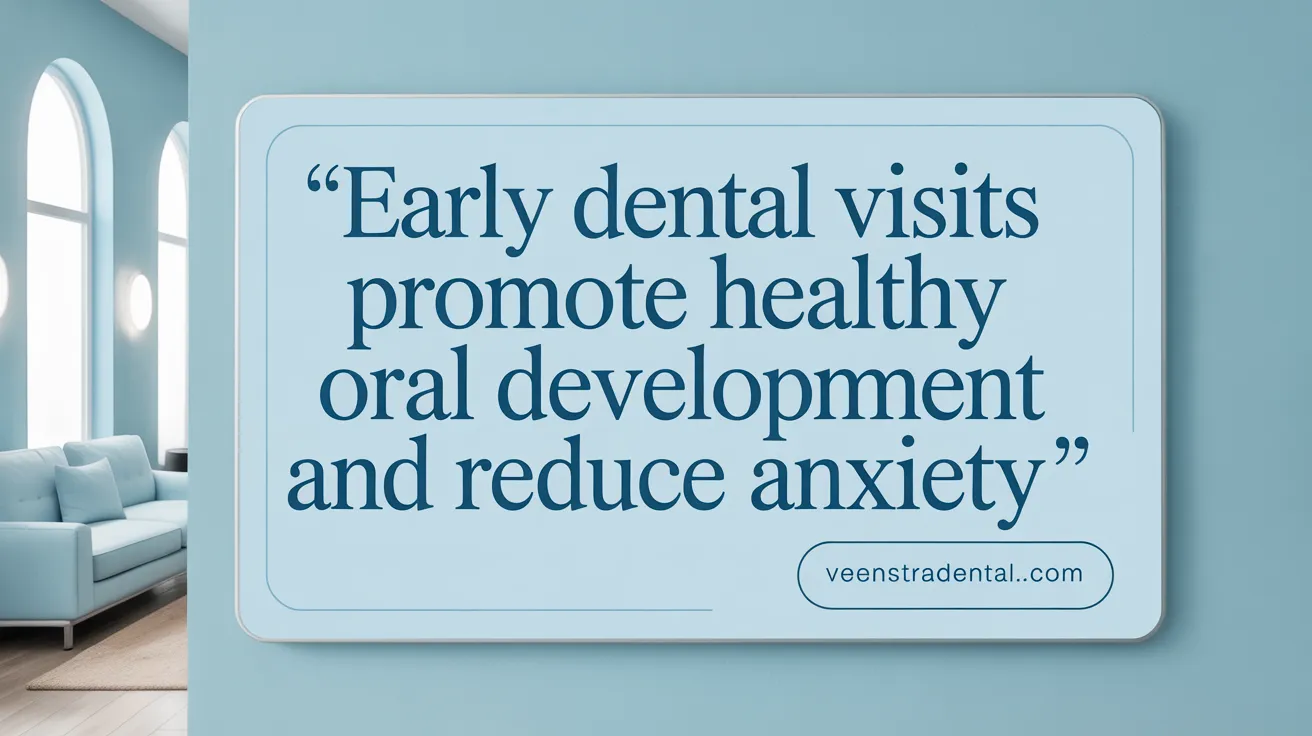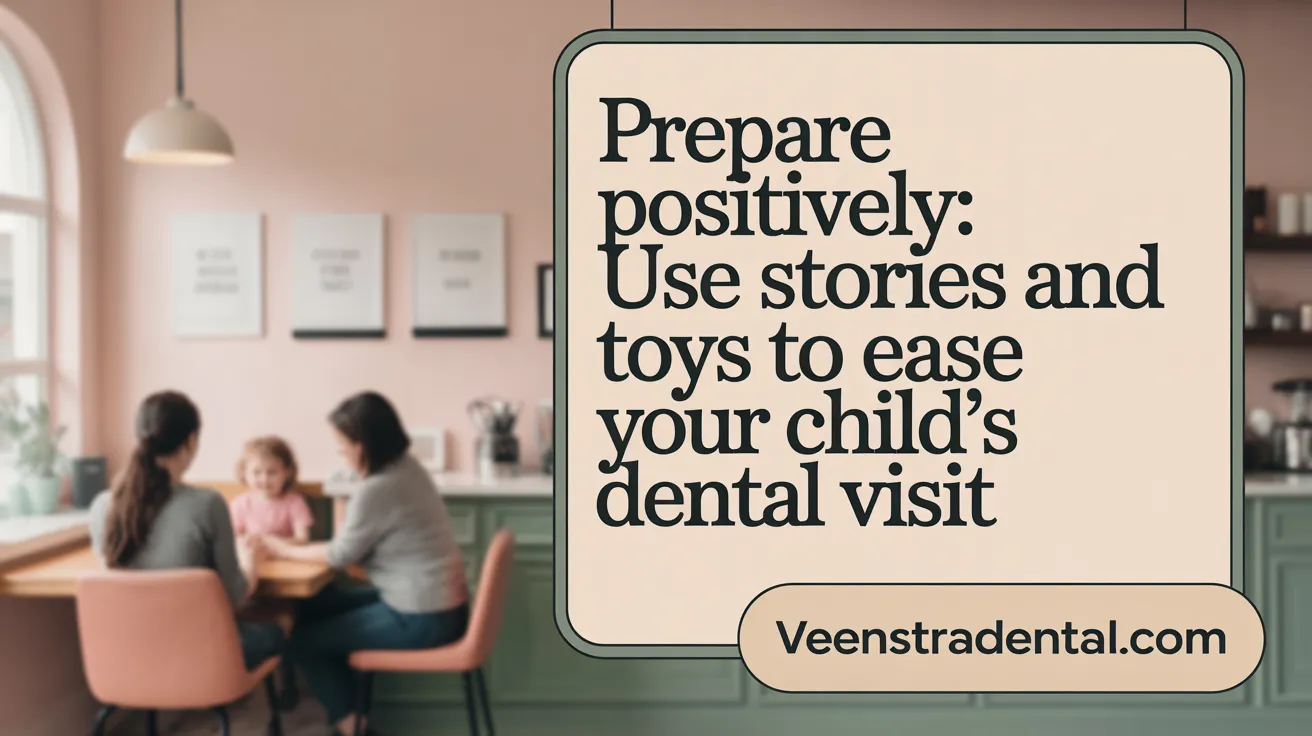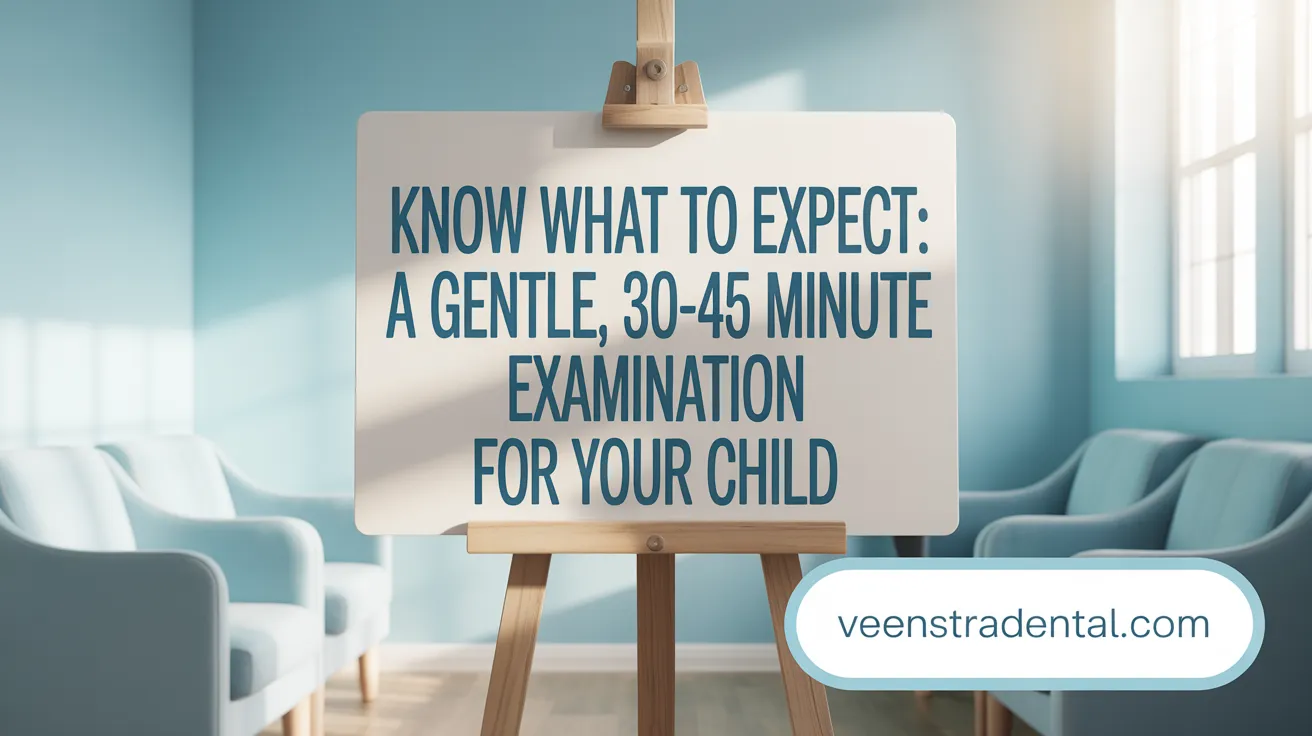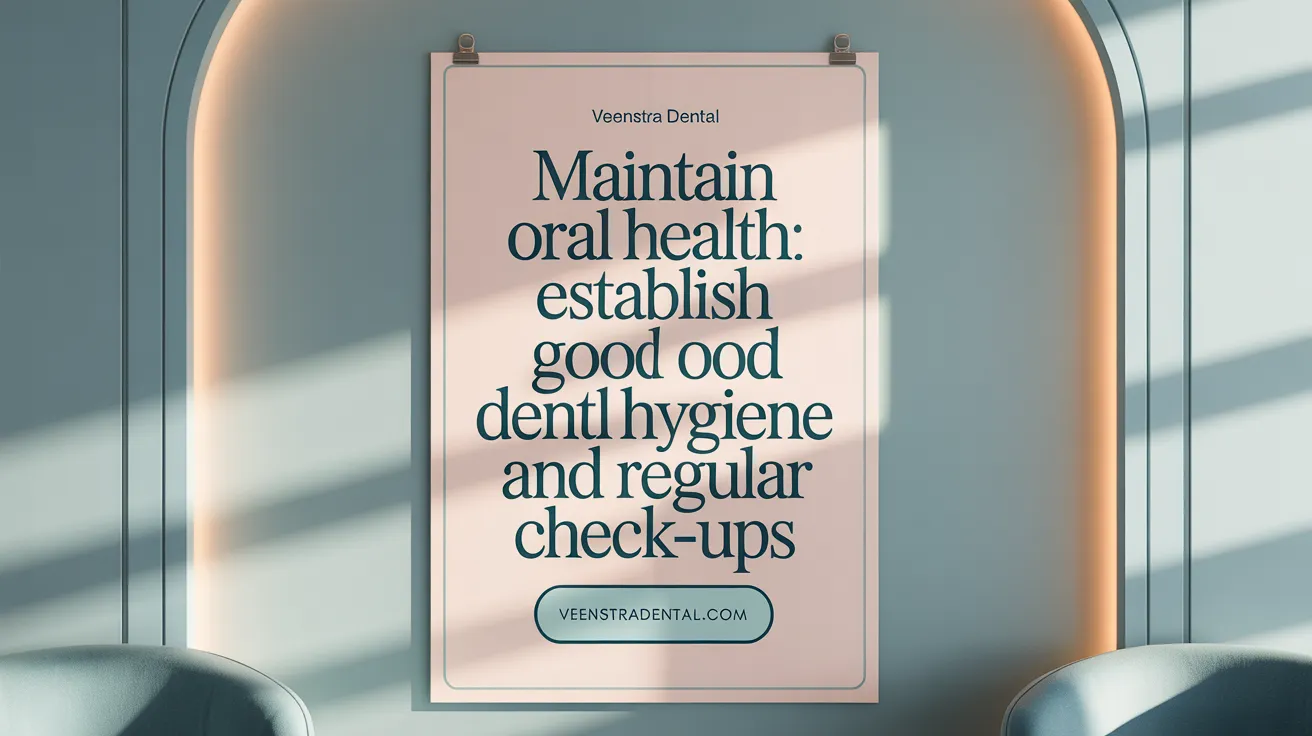Introduction to Your Child's First Dental Appointment
The first dental visit is a milestone that shapes your child's future oral health habits and attitudes toward dental care. Experts recommend scheduling this appointment within six months of the appearance of the first tooth or by the child's first birthday, whichever comes first. This initial visit is designed to familiarize both child and parent with dental care, promote prevention, and set the stage for a lifetime of healthy smiles.
When and Why to Schedule the First Dental Visit

Recommended Age for First Visit
Children should have their first dental appointment within six months of the eruption of their first tooth, or by their first birthday, whichever comes first. This timing is widely supported by professional organizations, including the American Academy of Pediatric Dentistry and is detailed in resources like the Child's first dental visit.
Importance of Early Dental Visits
Early dental visits help familiarize children with the dental office environment and reduce potential anxiety. Beginning dental care early promotes healthy oral development and allows dentists to monitor a child's growth effectively. Establishing a "dental home" by age one encourages routine care, preventive treatment, and parental guidance, as explained in the Child Dental Home by Age One and When to take child to dentist.
Goals of the First Appointment
The initial visit typically lasts 30 to 45 minutes and includes a comprehensive examination of the teeth, jaws, bite, gums, and oral tissues. Dentists evaluate the child's oral health, check for early signs of decay, perform gentle cleaning, and provide education on proper oral hygiene. Fluoride treatments and dietary advice are often discussed to prevent cavities. For an overview of what to expect, refer to What to Expect Your First Dental Appointment and Child's First Dental Visit.
Consequences of Delayed Visits
Delaying the first dental visit beyond the recommended age increases the risk of dental caries and other oral health issues. Children who start dental care late have higher odds of developing cavities and may require more invasive, costly treatments later. Early intervention improves long-term oral health, reduces emergency dental visits, and lowers overall treatment expenses. More information can be found in Preventive Dental Visits Benefits and Have Not Been to Dentist in Years.
Preparing Your Child and Yourself for the Appointment

How to explain the visit to children
Preparing children for their first dental visit involves explaining what to expect in simple, age-appropriate language. Parents should talk positively about dental care and use gentle descriptions to lessen fear and promote cooperation. See Preparing Children for Their First Dental Visit for more tips.
Use of storybooks and videos
Using child-friendly books and videos about dental visits can familiarize children with the process, reducing anxiety and making the experience more enjoyable. Visual aids and stories featuring familiar characters help children understand what will happen. For strategies on reducing dental anxiety, see Preparing Children for Their First Dental Visit.
Scheduling considerations
Schedule the appointment at a time when the child is well-rested and alert, often early in the day. Avoid scheduling when the child may be hungry or tired to promote a positive and cooperative experience. More on Scheduling Your Child’s First Dental Appointment.
Bringing comfort items
Allowing children to bring a favorite toy or comfort object to the appointment can help them feel secure and reduce anxiety during the visit. See First Dental Visit Tips for Parents for suggestions on easing children's dental visit anxiety.
Calm parental attitude
Parents should maintain a calm and positive demeanor, speaking cheerfully about the visit. This helps children feel reassured and models a confident attitude toward dental care. Guidance available at Tips for Taking Your Child to the Dentist.
Avoiding transmission of anxiety
Parents are advised to avoid showing their own dental fears or anxieties, as children can pick up on these emotions. Remaining relaxed and supportive encourages children to approach the visit positively. See Child’s First Dental Visit - Preparing Children for more insights.
What to Expect During the First Dental Visit

Typical Duration
A child's first dental visit usually lasts between 30 to 45 minutes. This timeframe allows the dentist to perform a thorough examination while ensuring the child remains comfortable and cooperative. For more details on the Child's first dental visit, see Stanford Children's Health fact sheet.
Examination Procedures
During this visit, the dentist conducts a comprehensive checkup including an examination of the child's teeth, jaws, bite, gums, and oral tissues. The goal is to assess oral growth and development and detect any early signs of dental issues. Additional useful information on Dental exam for children can be found at Stanford Children's Health.
X-rays and When They Are Used
X-rays are generally avoided at this first visit unless there is a strong indication such as suspected tooth decay or developmental concerns. If necessary, digital X-rays are used due to their low radiation exposure. Learn more about Digital dental x-rays and benefits from Gentle Dental.
Cleaning and Fluoride Treatments
If the child is relaxed, the dentist may perform a gentle cleaning and polishing to remove plaque and stains. Fluoride treatments may be applied to protect against cavities and strengthen tooth enamel. More on Fluoride treatments for children is available at Stanford Children's.
Health History Review
The dentist reviews the child's complete health history, including medical conditions and oral habits such as pacifier use or thumb sucking. This information helps tailor a personalized care plan. For specifics on Health history discussion during the first dental visit, see Gentle Dental resources.
Behavioral Considerations
Understanding a child's age and behavioral responses helps the dentist adapt the visit to keep the child at ease. Parents are encouraged to remain calm and explain the visit to help reduce anxiety. Tips on Preparing your child for a dental visit and addressing Dental anxieties with your child can be helpful.
Pediatric Dentist Roles
Pediatric dentists specialize in creating a child-friendly environment, using kid-appropriate language, and employing gentle techniques to make the experience positive. They provide education on oral hygiene and dietary habits to support lifelong dental health. See Child Care Staff Oral Health Checklist for best practices in promoting oral health in children.
Post-Visit Dental Care and Follow-Up

Dental hygiene practices at home
After your child's first dental visit, establishing a consistent dental hygiene routine is essential. Cleaning your child's gums before teeth emerge, using a damp cloth or an infant toothbrush, lays the foundation for healthy habits.
Brushing and flossing guidelines
Once teeth appear, brush twice daily with a small, soft-bristled toothbrush. Use a tiny smear of fluoride toothpaste for children under 3 and a pea-sized amount for those aged 3 and older. Parents should assist and supervise brushing until children are 7 or 8 years old to ensure proper technique.
Introduce flossing as soon as two teeth touch, helping remove plaque and food particles that brushing alone cannot reach (Brushing and flossing guidance for children, Preparing for Your Child's First Dental Visit).
Dietary recommendations
Limiting sugary treats and sweetened drinks is crucial to prevent cavities. Offer water between meals and encourage fruits instead of juice to reduce the risk of tooth decay. Avoid giving bottles of milk or juice at bedtime to prevent baby bottle tooth decay.
Frequency of dental visits
Regular dental visits every 6 months are recommended for ongoing monitoring and professional cleaning. Some children may require more frequent check-ups based on their dental needs (Recommended dental visit frequency for children).
Preventive tips
In addition to avoiding sugary drinks, maintain good oral hygiene routines and encourage a balanced diet. Employ fluoride treatments and dental sealants as recommended by your dentist (Preventative dental care tips for kids, Dental sealants and fluoride varnish treatments).
Supervision and positive reinforcement
Parental involvement in brushing and flossing builds good habits. Praising cooperative behavior during and after brushing reinforces a positive attitude toward dental care, ensuring your child looks forward to their dental visits (Preparing Children for Their First Dental Visit, Tips to prevent tooth decay in children.
Establishing a Dental Home and Long-Term Oral Health
What is a dental home and why is it important?
A dental home is an ongoing relationship between a child and their dentist, starting by age one or within six months of the first tooth erupting. This concept emphasizes comprehensive, continuous, and preventive-focused oral care. Establishing a dental home early ensures proper monitoring of oral growth and development, helps prevent dental disease, and promotes lifelong dental health. For more information, see Dental home by age one.
What benefits come with early and regular visits?
Regular dental checkups, ideally every six months, allow for early detection of decay and other issues. Early visits foster familiarity and comfort with dental settings, which reduces anxiety and promotes cooperative behavior. Children seen early usually experience fewer cavities and require less invasive treatments later. Scheduled visits help dentists provide personalized guidance on oral hygiene and dietary habits tailored to the child’s developmental stage. Learn more about Benefits of early dental visits and Children's Behavioral Responses to Dental Care.
How does dental care integrate with overall medical care?
Many dental homes collaborate with medical providers to deliver preventive services like fluoride varnish in medical offices. This integration enhances accessibility to early dental care, especially for vulnerable populations, and supports a holistic approach to a child's health. More details can be found at Fluoride varnish programs in medical settings.
How can dental anxiety be reduced over time?
Consistent positive dental experiences, coupled with parental preparation and supportive dental staff, greatly reduce fear and anxiety. Using distraction techniques, positive reinforcement, and age-appropriate communication helps children feel secure during visits, enabling smoother future appointments. Strategies for this are outlined in Preparing Children for Their First Dental Visit.
What advanced preventive care supports oral health?
Dental sealants, applied particularly around age six, can prevent up to 80% of cavities on chewing surfaces. Early visits allow timely application of sealants and fluoride treatments, key in arresting and preventing tooth decay. For further details, see Dental sealants and fluoride varnish treatments and Preventive dental care for children.
How do early dental visits lead to cost savings?
Children who start dental care early generally have lower treatment costs by reducing the need for emergency or surgical procedures. Early management of dental caries prevents complex interventions, resulting in improved oral health outcomes and financial savings for families. More on this is available at Benefits of early dental intervention.
Ensuring a Healthy Smile from the Start
A child's initial dental visit is a foundational step toward lifelong oral health. By scheduling the appointment early, preparing the child with positive communication, understanding what to expect, and maintaining good care routines afterward, parents can help their children develop trust and healthy habits that endure. Establishing a dental home promotes ongoing prevention, reduces dental anxiety, and supports the overall well-being of the child. Early and regular dental care not only safeguards teeth but also contributes to a confident, healthy future.
